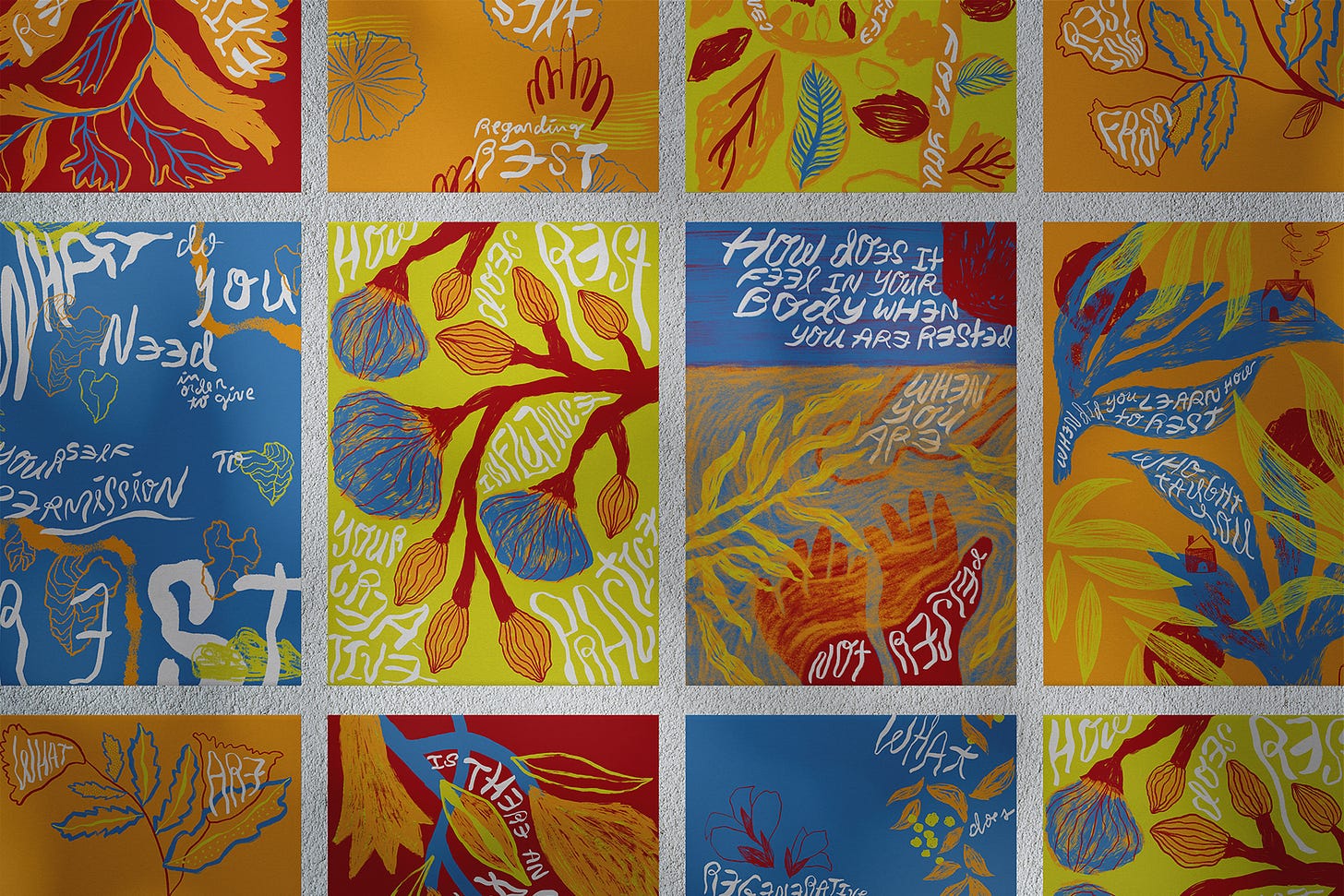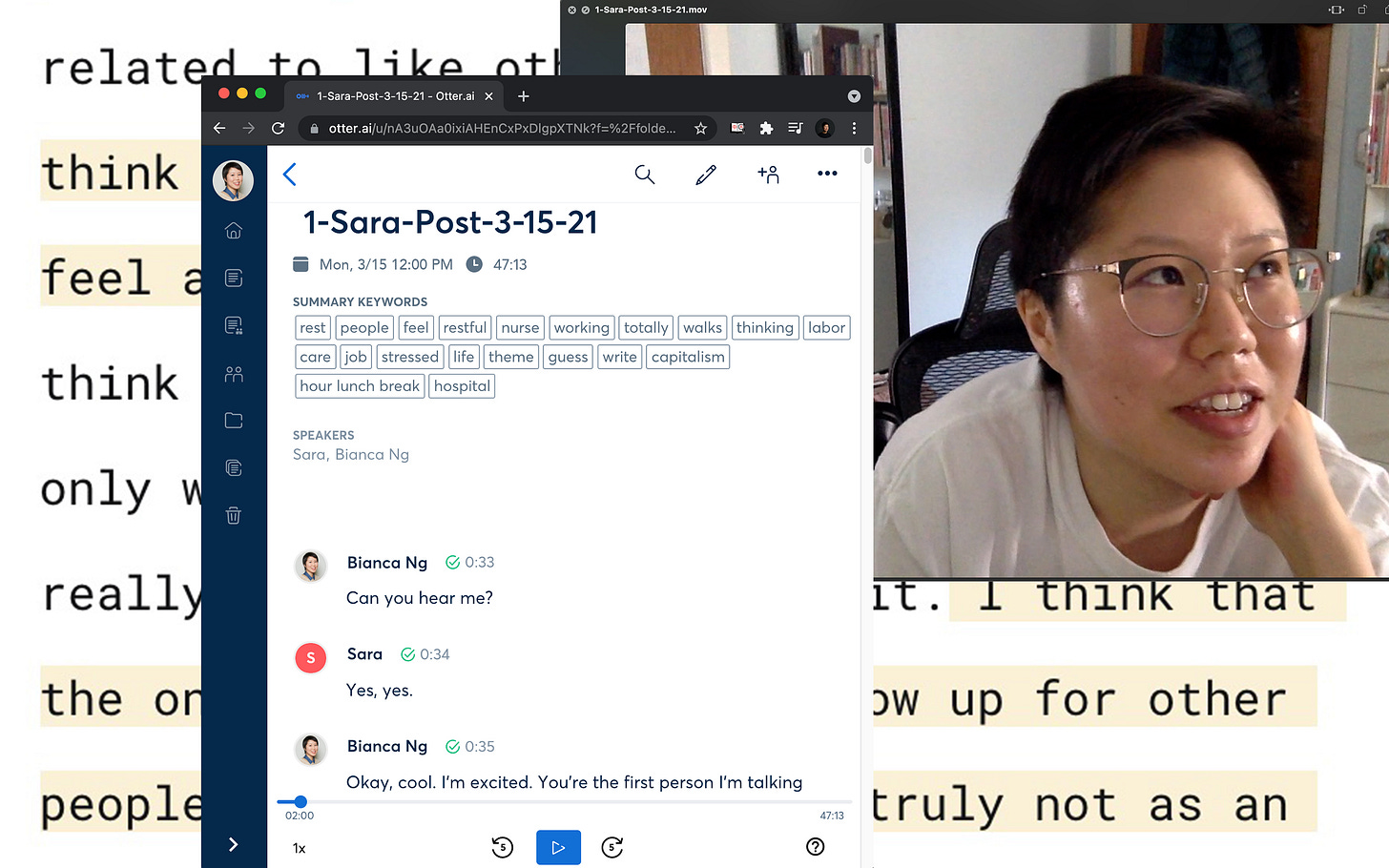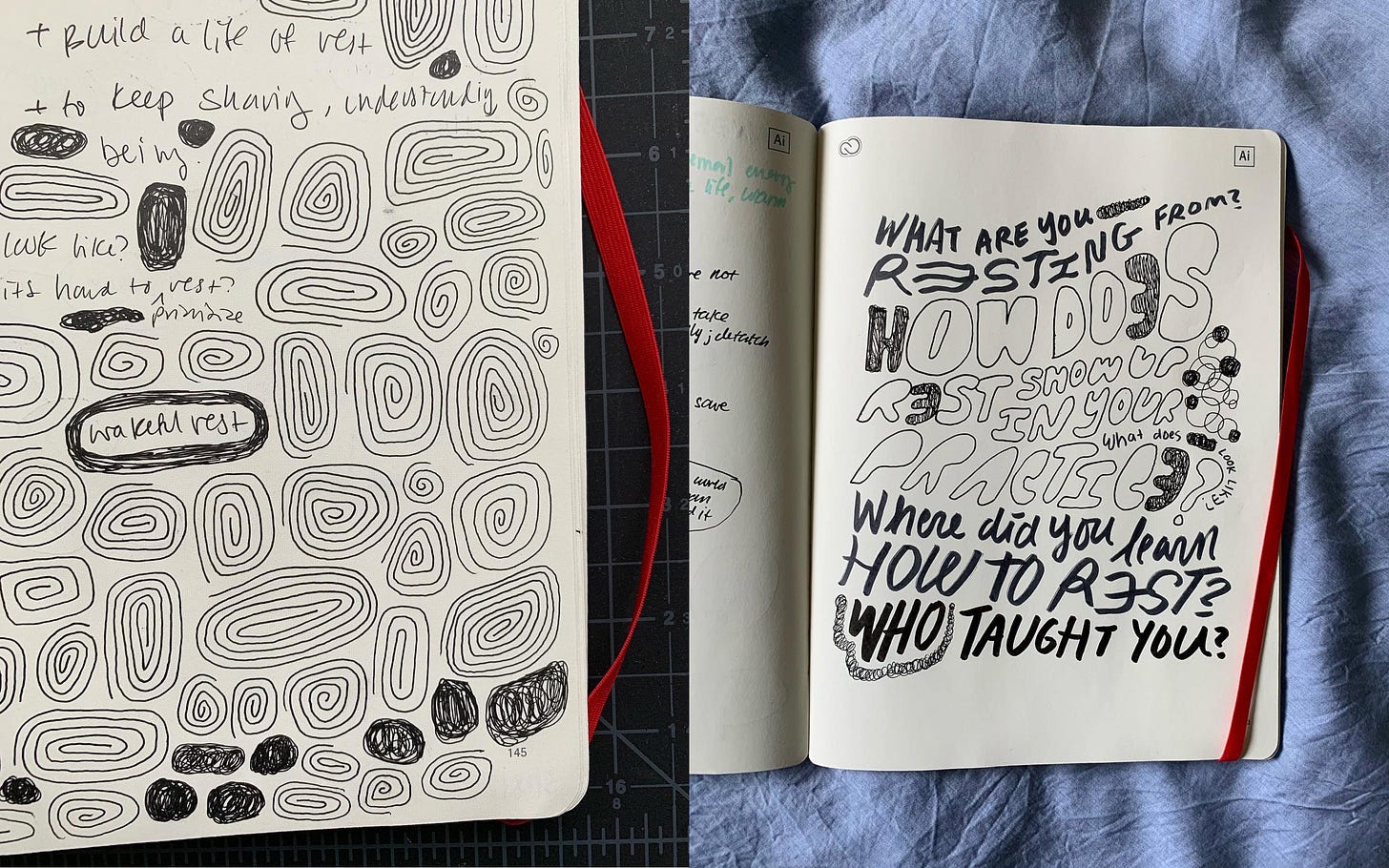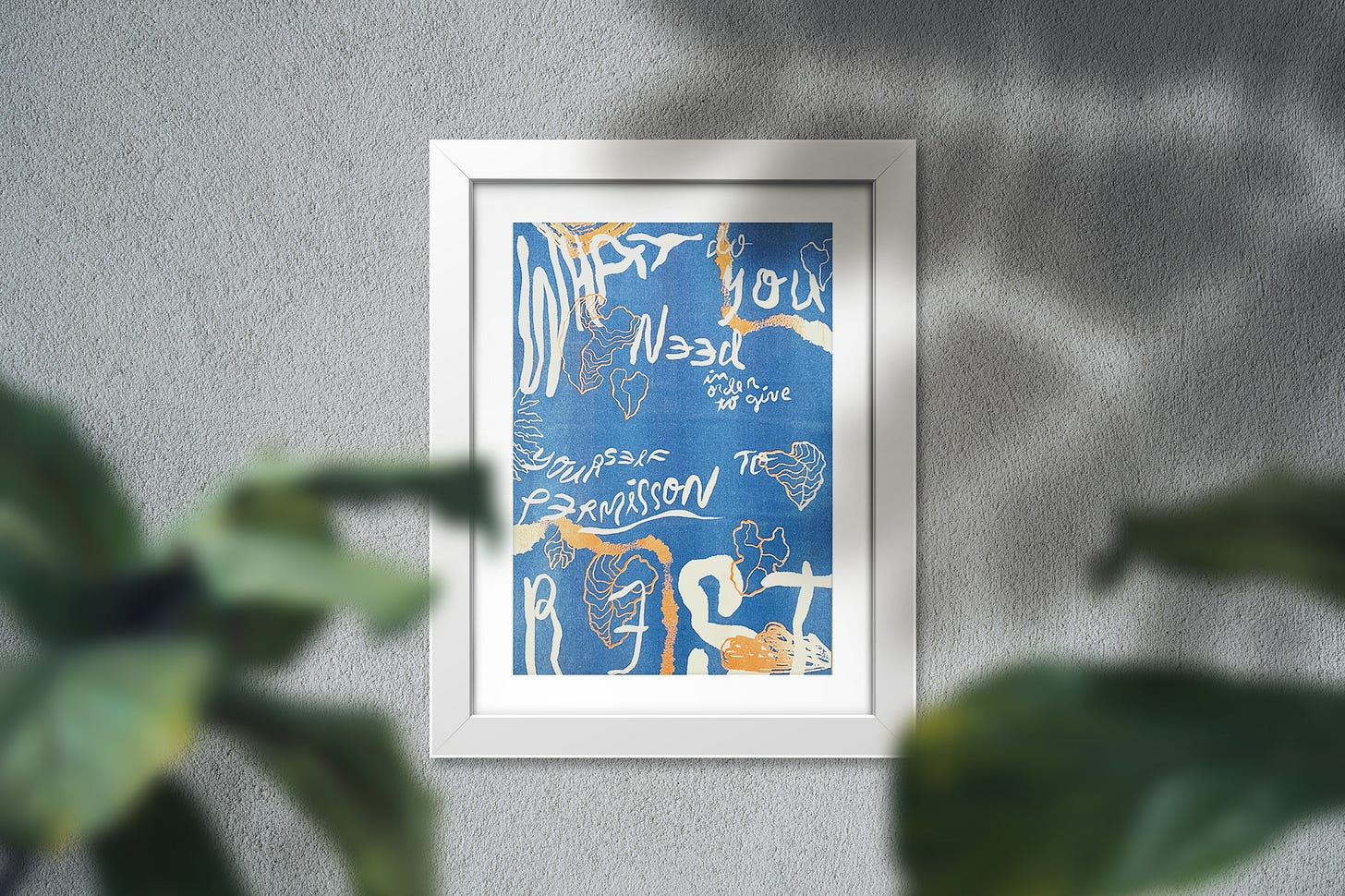14 / rest begets rest
First, I wanted to say thank you for all the warm birthday wishes. I read through them all and I felt moved by your words! Second, I’ve been MIA because I’ve been facilitating sessions and creating my final art piece as an Artist in Residence at The Seventh Wave (among other personal things that I won’t dive into for now). Right now, I’d just like to celebrate and share this special thing I brought to life over the course of fourish months. Part 1: a personal essay, Part 2: fifteen conversations with TSW contributors + staff members, Part 3: artwork inspired by it all. Enjoy below and/or here on my website! <3

As a child, my mom would brag about how I could tolerate the most bitter Chinese vegetables that even adults didn't enjoy eating. I wasn't taught how to listen to my needs; I was taught how to keep my head down, to quietly swallow the bitterness.
I watched my parents work multiple jobs to make ends meet as immigrants from China. After 20 plus years of working as a sushi chef, my dad finally retired in 2020. When he retired, my mom proudly stated in Cantonese, “Since he started working here, Dad’s only taken five days off.” My mom, sister, and I had been trying to convince him to quit for the last few years; he only retired because of the global pandemic. Otherwise, I'm not sure when he would have.
Perhaps like my parents, much of my life has been spent numbing myself through output. After college, I worshipped the creative industry, which I felt privileged to be a part of. It was a rite of passage that in a single week, you had to work a full-time job for 50 hours and have a side hustle you worked on for another 30 hours. Otherwise, you could barely consider yourself a designer. I remember reading articles, books, and talks from leaders in the industry romanticizing the grind. I accepted their truth as facts. I became addicted to productivity. Ironically, the more overworked I became, the more work I took on. I would rather say yes to five no's than unpack why I kept saying yes. I needed to be overworked because if I wasn't, then how would I define my self-worth? I was so distracted by my exhaustion and desire to feed my ego that I couldn’t see beyond my tunnel vision of surviving this current thing and then the next thing.
Somewhere between middle school and post-college, I believed being high-strung and stressed was just a part of my personality. Even when I was succeeding in my early 20s, defined by traditional, capitalistic standards and exhilarated by the thrill of it all, I knew I was deluding myself. But how could I reimagine a different way of being when this was all I'd ever known? This is how capitalism keeps you on its leash without exerting any force: You're so deep into the grind that you believe these are your values, and this is who you've always been, and this is how you want to live your life.
When I reflect back on moments in my life when I needed rest the most, I remember how hard I pushed myself to the point of physical and mental exhaustion, worn as a badge of honor. My exhaustion is proof that I care more than you. Look how strong I am because I don't need rest. I placed my self-worth on what I did, so by that logic, if I did the most, regardless of my well-being, that meant I was worth something more.
When did I learn that the definition of my worth was from doing and not from being? Am I only as valuable as what I can offer? The creative industry scoffs at the concept of work-life balance. Is it really impossible, or are we just too tired to imagine a life where we can live in balance with rest and creation?
I’ll never forget when I reached the deepest pit of my addiction to productivity; that week I cried in therapy, I cried on the city street corner while on the phone with my best friend in the morning, I cried in the bathroom at work, I cried on the subway going home, and I cried in the shower. I’m not someone who cries easily, especially not in public or with other people. I was physically exhausted, overwhelmed with student loans, and living such a precarious life that any mistake felt like the end. I let what I do define who I was and when I no longer wanted to do, I didn’t know why I still needed to be here. I defined my value as a human by what I could do and believed that if I worked hard enough, money and prestige would not only give me security, but also fulfillment and happiness.
But from that low point, I realized that no job would ever be worth making me feel that way again; no job is guaranteed and no amount of money would ever give me the sense of security I was seeking. I vowed to focus on paying off my student loans and self-fund a three-month creative sabbatical backpacking through Japan, the one place I would have regretted not visiting in this lifetime.
Solo traveling was the first time I found peace within myself and recognized that I am more than my output. Being in a new environment, taking myself completely out of context from all that I’ve ever known to be true, gave me the spaciousness to imagine a different me. Each person I encountered wasn’t concerned with what I did or could do, but who I was in that moment. Suddenly, my output didn’t have as much value as it used to have, but it didn’t feel debilitating. It felt liberating. Traveling was not a vacation; oftentimes, my mental and physical limits were tested, but I was humbled by strangers who welcomed me into their homes, shared food and stories with me, and showed me their values. Time and distance away from the structure of the life I had been living made me realize it wasn’t the life I wanted to continue living, and most importantly, it wasn’t the only option either. After finding security within my sense of self, I finally felt able to trust myself to choose the values I wanted to live by.
When was the last time you reflected upon your values? Not your parents’, sibling's, partner's, friend's, or society's. Your own. The first time I did, I was terrified that I picked the wrong values, and it would lead me down a path of despair. Now, I reflect on my values every year, and the more I do it, the clearer my values become. I am constantly changing and evolving as I gain more insight and life experiences, so it's only natural my values should change to reflect that. My values for 2021 are abundance, grace, interdependence, daring, vision, and presence. My responsibility to myself is to make decisions that align with my values; this is my definition of success.
Admitting my values do not align with the capitalistic society I grew up in and that I want a different life feels scary. But I don't want to brag about how busy I am anymore. I want to celebrate how present I am. I want to brag about how prioritizing rest allows me to show up more fully for the people in my life.
In the brief time we're on this earth, don't we owe it to ourselves to figure out what rest is and what it can be, and how to live in alignment with values we set for ourselves?
My definition of rest is embodied presence, solitude, quiet, nature, slow movement, warm water, nourishing food. I imagine meditating, lying in the grass, being submerged in water, strolling through a garden, having a deep, dreamless sleep, drawing in my sketchbook, cooking a meal, listening to the wind blow through lush trees, or sitting at the peak of a mountain. It's being careless with time and getting lost in taking photos of different colored rocks because wow, did you know rocks could be all shades of pink and purple?
Sometimes I feel guilty, worrying that rest is selfish because I'm not serving or thinking of anyone, and there isn't necessarily an output. I connect resting with being a bad person who doesn't care about my loved ones and neglects my responsibility to society. Capitalistic values have been so ingrained into my being that no matter how far I run, it will still make me second guess actions that benefit my own well-being. Rest is an act of rebellion when you were born into a capitalistic society that tells you rest is an opportunity cost.
The truth is this: The ability to care for ourselves directly correlates with how well we can care for others. The way we care for ourselves is to tend to our needs. From my observations, so much of my parents' lives were about survival. I finally realized that I can honor my ancestors, who struggled through famine, war, violence, and immigration, by healing my family's intergenerational trauma. I owe it not only to myself but to them to not just survive, but to thrive. Part of healing that trauma is finding wholeness and peace within myself and living a life based on the values I believe in. And rest plays an integral piece in my healing process.
When I am rested, I can breathe deeply, think clearly, listen actively, and make embodied choices. I'm alert and grounded. All my senses are engaged with the environment around me, but it doesn't feel overwhelming. It feels expansive and nourishing. I am open to life’s possibilities and allow my curiosities to guide me. What I’ve come to realize is that my presence and attention, not my output, are my greatest gifts I can offer in this lifetime.

Conversations
I find myself asking questions I don't know the answers to, and the process of inviting others into my questioning has been gratifying. Over two months, I had fifteen 45-60 minute conversations about collective rest with the rebellious joy residents, contributors, and staff members of The Seventh Wave. Through conversations, I'm able to uncover some tiny understanding for myself that feels true for me. Each conversation helped inform my essay, final art piece, and perspective.
The set of questions I had from my first conversation slowly evolved with each new person I spoke with. But the word that kept lingering in my brain was 'permission.' The final question after my last conversation, which felt like the manifestation of these collective discussions, was "What do you need in order to give yourself permission to rest?"
I'm grateful for anyone who has humored my questions and offered their time (with this project and any other). I think I fall a lil in love with every conversation I have, whether it's with a stranger or an old friend. You can read selected quotes from the conversations linked below or as I share them on my Instagram.

Process
When I first set out to manifest a project about the radical importance of rest, I felt overwhelmed with research and thoughts. The hardest part was trying to make sense of what I wanted to say through the essay and narrowing down the most poignant quotes from the conversations. I went from 35 to 8 pages of quotes; it was painstakingly difficult because each conversation contained infinite wisdom. My favorite part in the process was having conversations about rest with TSW community (and friends).
Lately, I've been obsessed with analyzing my dreams. The colors in the artwork were taken from a dream I had where these distinct four colors showed up. It felt bizarre to me because I never dream in or of colors. Sleep and nature are the most direct connections to rest for me so I wanted the artwork to convey a dream-like feeling inspired by nature.
I want to believe every conversation I had about rest these past fourish months sparked more conversations. Maybe it planted a seed into people's subconscious to make space for rest. My hope for this project is to spark more discussions between people, so we produced a set of postcards meant to be shared with loved ones. This limited edition set of twenty 5x7” postcards and one 10x16” risograph printed poster can be purchased below through The Seventh Wave store. Your purchase directly supports my work, TSW community, and local print shops in Brooklyn and Seattle.
p.s. If you send postcards and have convos about rest with your beloveds, I'd love to know what ya learn (biancang.design@gmail.com).
p.p.s. If you purchased the harmer/harmed zine back in November, there were some USPS shipping issues because of the holiday season. This time should be all good, but thank you for your patience and support.


